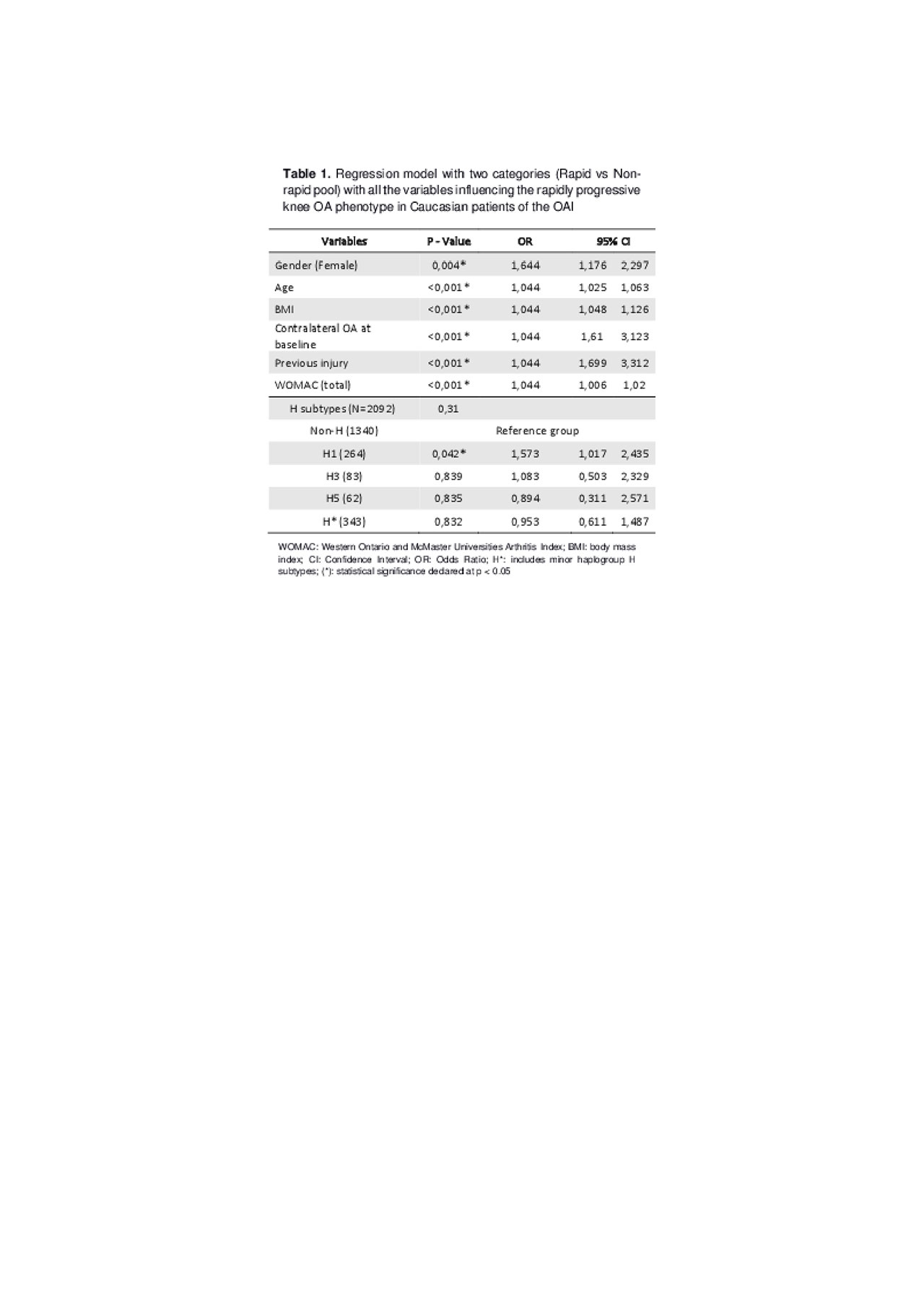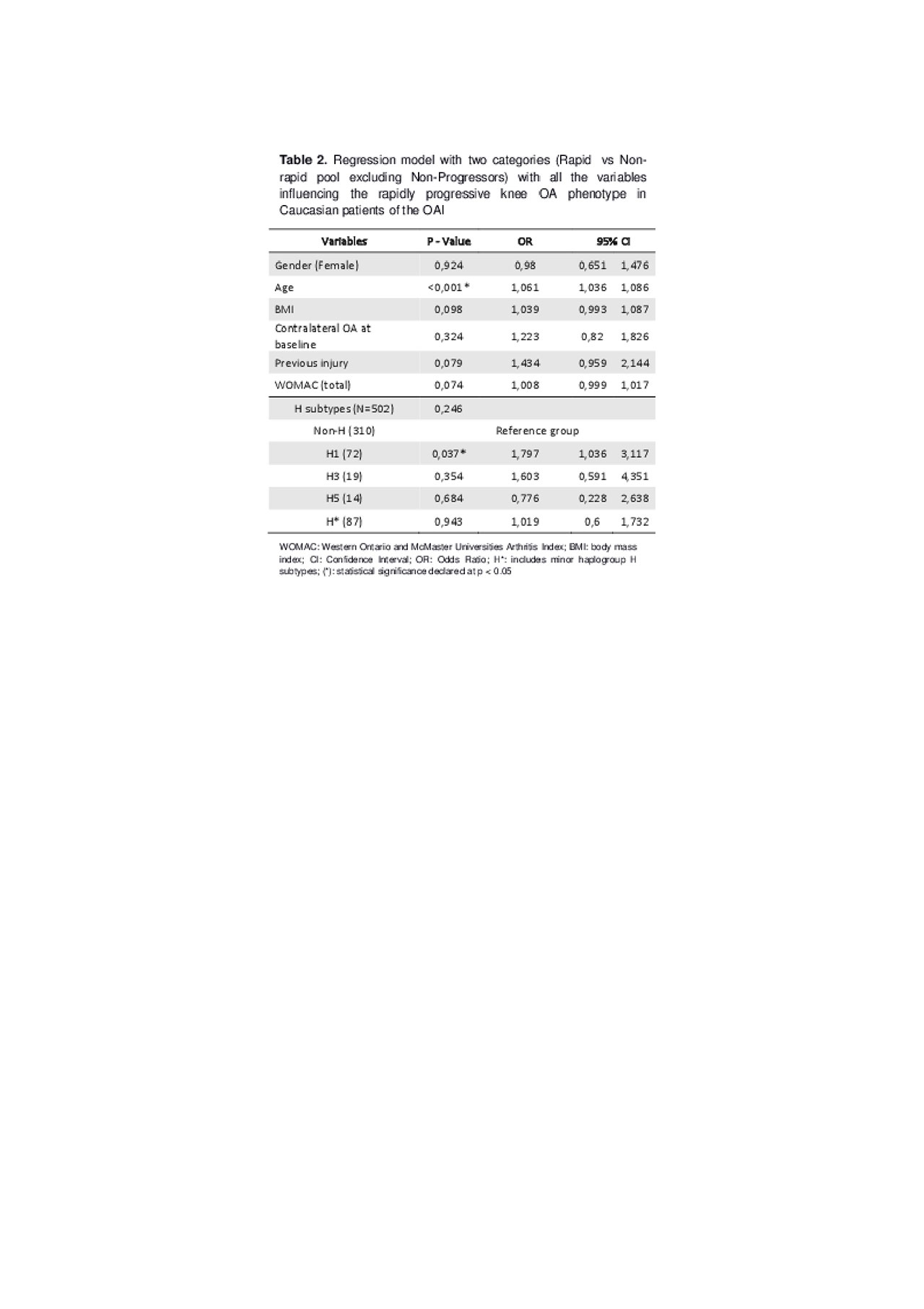Session Information
Session Type: Poster Session (Tuesday)
Session Time: 9:00AM-11:00AM
Background/Purpose: There is a need to identify the rapid progressive phenotype of Osteoarthritis (OA). Our aim is to analyze the effect of mitochondrial haplogroups in the risk of suffering rapid progressive knee OA in patients from the Osteoarthritis Initiative (OAI).
Methods: Caucasian patients from the OAI were classified into three groups based on previous criteria: i) Rapid progressors (RP), with baseline KL grade 0-I in at least one knee and increase up to KL≥III during 48 month follow-up; ii) Non-rapid progressors (NRP), with baseline KL grade 0-I in at least one knee and increase up to KL=II during 48 month follow-up; iii) Non-progressors (NP), with KL grade 0-I at baseline in at least one knee and bilaterally stable during the 48-month follow-up period.
Also, these groups were re-categorized into two groups: Rapid and Non-Rapid (pooling NRP and NP). Once selected, we performed regression models adjusting by clinical variables including gender, age, body mass index (BMI), contralateral OA, previous injury in the target knee and total WOMAC. mtDNA haplogroups and major H sub-haplogroups (H1, H3, H5 and H*) were previously assigned using sequencing techniques. Analysis were performed with IBM SPSS Statistics v24.
Results: We analyzed data from 2092 patients splitted on 181 RP (8,7%), 321 NRP (15,3%) and 1590 NP (76%). The comparison between RP and NP revealed that all risk factors showed significant differences, including gender (female) (OR=1,934; 95%CI: 1,377 – 2,717; p< 0,001), age (OR=1,040; 95%CI: 1,021 – 1,060; p< 0,001), BMI (OR=1,113; 95%CI: 1,073 – 1,154; p< 0,001), contralateral OA (OR=2,710; 95%CI: 1,938 – 3,773; p< 0,001), previous injury of target knee (OR=2,849; 95%CI: 2,032 – 4,000; p< 0,001) and total WOMAC (OR=1,016; 95%CI: 1,008 – 1,023; p< 0,001); however, these significant differences were also observed between NRP and NP. Regarding mtDNA haplogroups, compared with haplogroup H, the haplogroup J showed a lower frequency in the RP in relation to NP, but this difference did not reach the statistical significance (OR=0,526; 95%CI: 0,251 – 1,101; p=0,088). When the analysis included major H subtypes, sub-haplogroup H1 appeared over-represented in the RP in relation to both NP (OR=1,533; 95%CI: 0,981 – 2,934; p=0,061) and NRP (OR=1,686; 95%CI: 0,984 – 2,889; p=0,057).
A second type of analysis included the re-categorized variable and, in addition to the significant association of the classical risk factors, the sub-haplogroup H1 appeared significantly associated as a risk factor for rapid progression (OR= 1,573; 95%CI: 1,017 – 2,435; p=0,042) (Table 1). Finally, we repeated this analysis but excluding NP from the Non-Rapid pool. Age was the only significant risk factor (OR=1,061; 95%CI: 1,036 – 1,086; p< 0,001), and the sub-haplogroup H1 remained significantly associated as a risk factor for rapid progression (OR=1,797; 95%CI: 1,036 – 3,117; p=0,037) (Table 2).
Conclusion: The mtDNA haplogroups, more specifically the major sub-haplogroup H1, increase the risk of rapidly progressive OA of the knee. The assignment of this mitochondrial genetic sub-haplogroup could be useful as complementary genetic biomarker for the early identification of this OA phenotype.
To cite this abstract in AMA style:
Duran-Sotuela A, Fernandez-Moreno M, Vázquez-Mosquera M, Ramos-Louro P, Dalmao-Fernández A, Relaño S, Oreiro N, Blanco F, Rego-Pérez I. Mitochondrial DNA Sub-haplogroup H1 Influences the Risk of Rapidly Progressive Osteoarthritis of the Knee: Data from the Osteoarthritis Initiative [abstract]. Arthritis Rheumatol. 2019; 71 (suppl 10). https://acrabstracts.org/abstract/mitochondrial-dna-sub-haplogroup-h1-influences-the-risk-of-rapidly-progressive-osteoarthritis-of-the-knee-data-from-the-osteoarthritis-initiative/. Accessed .« Back to 2019 ACR/ARP Annual Meeting
ACR Meeting Abstracts - https://acrabstracts.org/abstract/mitochondrial-dna-sub-haplogroup-h1-influences-the-risk-of-rapidly-progressive-osteoarthritis-of-the-knee-data-from-the-osteoarthritis-initiative/


